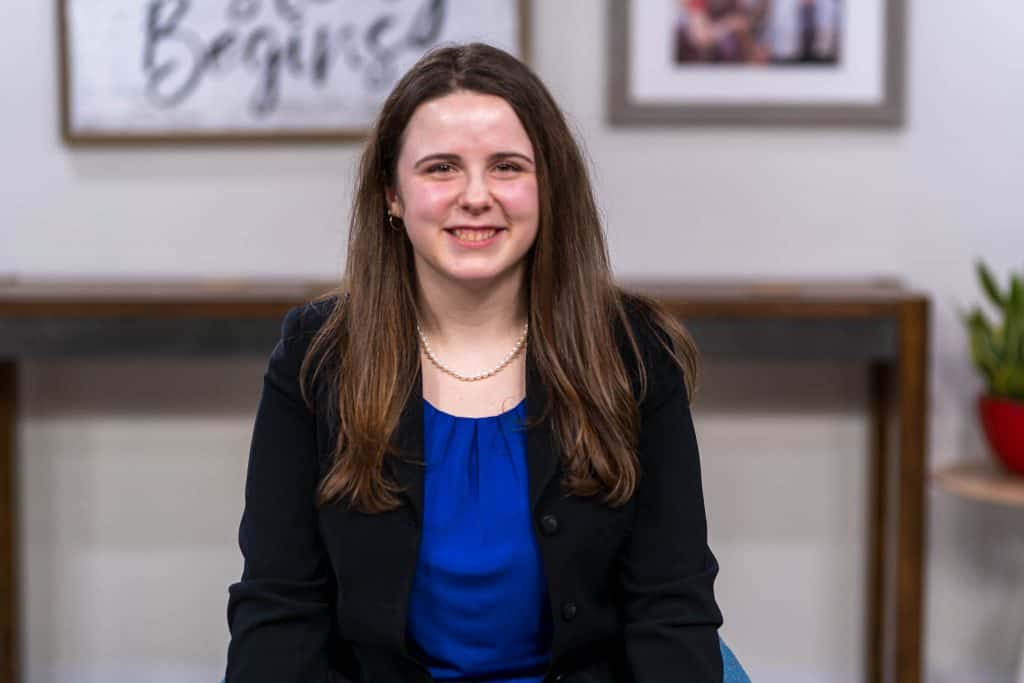

A diagnosis at 19 months old set off a chain of events that continues to lead one Tabernacle resident to success.
Now 23, Tori Hendrickson’s life journey with cerebral palsy has earned her accolades both academically and professionally.
She was diagnosed at the Children’s Hospital of Philadelphia and entered therapy to reverse the effects of her condition and strengthen her motor skills. Unable to play soccer or “be as active as other kids growing up,” Hendrickson dove deep into her academics, pushing herself to succeed.
Attention to her illness increases each March, when the Cerebral Palsy Foundation raises awareness of the disorder and encourages people to raise money for treatments. Cerebral palsy is a group of disorders that affects a person’s brain by altering motor skills. It is the most common motor disorder in children, according to the Centers for Disease Control and Prevention. The severity of the condition is on a spectrum; one person may not have the same ability as the next. Some patients experience cognitive complications; Hendrickson didn’t.
“(My mom) never let me say no to myself and insisted that I could do anything,” she recalled. “Which has worked out better for me in my school life and my professional life with BAYADA (Home Health Care, where she works), because I challenge everything head on, and I don’t say that I can’t do something.”
Graduating from Seneca High School was one accomplishment; doctors had doubted Hendrickson would be able to walk across the school stage. She continued her educational feat within three years at Stockton University, attaining a 3.99 GPA.
“Not only was I accomplishing the undergraduate degrees, but I conquered so many other things in such a short time frame,” she recalled. “It was a culmination of goals to graduate from college, go to a great university — all with the support of my awesome parents.”
Another degree is in Hendrickson’s future; she is enrolled in a master’s program in business administration at Rutgers. She expects to graduate in the spring of 2021.
Hendrickson said Seneca helped her remain active with adaptive physical education programs while she became infatuated with academics. Cerebral palsy made her more outgoing, she added, so she was able to establish friendships and a robust support system.
Hendrickson is grateful to be on the mild end of the cerebral palsy spectrum; people have told her she “doesn’t look like she has cerebral palsy.”
Professionally, BAYADA Home Health Care became a landing point in her career, providing care to patients who seek treatments Hendrickson herself went through. She does not work directly with patients, but Hendrickson’s administrative focus is on supporting innovation projects and detailing future plans.
“One of the biggest parts of my plan is growing and developing with BAYADA,” she noted. “The organization has some really strong values and they are constantly giving back to the community that I belong to so strongly. When I was getting out of college, I wanted to work with an organization that I love working for every single day.”
As for her support system, Hendrickson recalled when her grandfather provided financial assistance to her parents following a job loss. Her grandparents spoiled her and treated her like a princess, she added, never seeing her as different. Her grandfather recently made a donation in her name to Shriner’s Hospital for Children in South Carolina, where she received free treatments there as a child.
“In my grandfather’s lifetime, he would have donated over half a million to the hospital in my name,” she shared.
Hendrickson wishes people would realize that not every person with “a brace or cap on their legs” has a cognitive delay. Those with cerebral palsy are capable of understanding things and should not be treated like a child, she explained.
Hendrickson continues to credit her success to the outlook she has forced herself to have. She practices daily self-reinforcements to remind her how far she has come, and to keep moving.
“It has brought so many more positive things to my life than negative things,” she noted. “I always like to say that we are differently able than ‘disabled.’
“It’s amazing because with cerebral palsy, you’re not necessarily disabled; I just have different abilities.”









